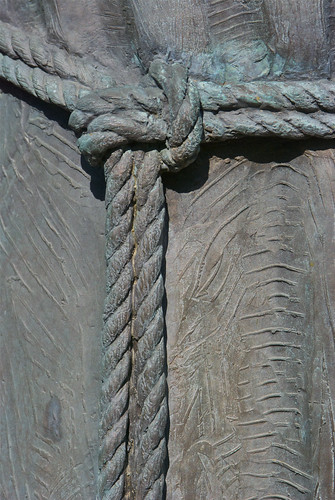cincture /SEENK-chər/. noun or verb. A girdle or a belt. More generally, something that encircles or surrounds. From Latin cinctura(girdle), from cingere (to gird, surround).
“Two immense, grape-coloured clouds butted and brawled in the vault of heaven, roped in by a cincture of spine and gorge.” (Nick Cave)
“As he was telling me this I pictured her in my mind, seeing her as one of those maidens of ancient Greece, in sandals and cinctured tunic, surging forwards in ecstatic welcome for the return of some warrior god or god-like warrior.” (John Banville)
“This rosy cincture encircling her middle stirred me deeply, suggestive as it was of tender punishment, exquisite suffering—I was thinking of the harem, no doubt, of branded houris and the like…” (John Banville)
“All the nuns at the convent wore plain blouses and skirts except for Sister Edgar, who had permission from the motherhouse to fit herself out in the old things with the arcane names, the wimple, cincture and guimpe.” (Don DeLillo)
“He is dressed for battle, but not in his staff sergeant’s uniform of the United States Marines. Instead, he wears the white robes of karate, cinctured with black.” (John McPhee)
“Ammons plays on the etymology: ‘succinct’ poetry is ‘cinctured’: ‘discinct’ poetry is unbelted, unbuttoned, the ‘bosh and flapdoodle’ of the human lexicon.” (Helen Vendler)




